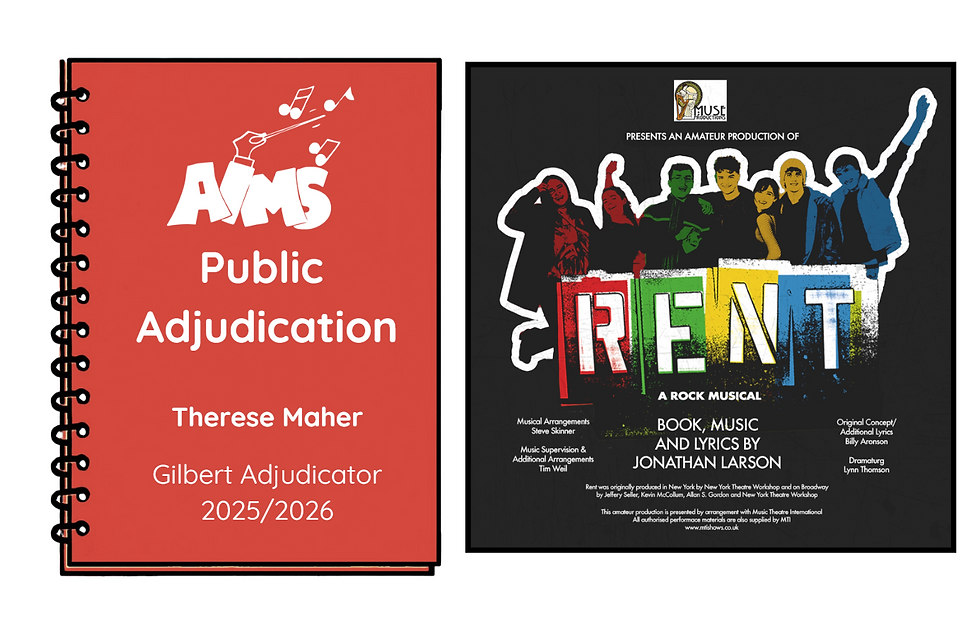Bare as presented by UCD Musical Society
- Darragh Carroll

- Nov 20, 2023
- 6 min read
Updated: Nov 21, 2023

Bare as presented by UCD Musical Society
Date of Adjudicated Performance: Thursday 28th September, 2023.
Gilbert Section - Peter Kennedy
There is an abundance of modern musicals centred around angst-riddled teenagers, struggling with their identity and trying to fit into a world populated by parents, school-teachers and church leaders who just don’t understand or want to address the woes of the younger generation. One of the most recent additions to that genre is Bare, which I have just seen, and very much enjoyed, for the first time. There are strong echoes of Spring Awakening in the setting, the format and the various situations that occur, excepting that the main focus in Bare is on a gay relationship, making it particularly relevant and important to the LGBTQ+ community. The messages that are brought to the surface through the telling of the story of Peter and Jason are by no means new, but they are always relevant, and their need to be told is manifest in so far as they provoke conversation, the essential starting point for encouraging change and acceptance. Much like Romeo and Juliet, which features significantly throughout the show, Bare is a tragedy, and a very touching one at that, but it is also laced with some very good comedy and inventive devices to prevent it from becoming a drudgery of disaster and depression. In its good balance, it all the more poignantly makes its points.
This particular production, in the hands of UCD students, was very much carried by excellent performances and good direction, which compensated, to some extent, for a technical presentation that needed a lot more work to reach its full potential. From a lighting point of view, moving heads were plentiful, but they were not employed with a high degree of accuracy, often missing their target or arriving late to capture the action. Some nice atmospheres were achieved but too often the overall effect was a tad bland. Perhaps the dream sequences of the show needed more surreal lighting also, to accentuate their diversion from the norm. The sound system was equally worrying, with much late cueing of radio mics, resulting in lines being lost, and issues, on occasions, with balance. Knowing the standards that these experienced technicians are capable of, I’m inclined to believe that perhaps more pre-show planning between them and the director may have been required.
Where the director, Sorcha McGlynn, was extremely successful, however, was in drawing forth a depth of character and understanding from her principals, and presenting their stories in an artistic and cohesive manner, with good use of the stage and a very strong focus on the relevant issues of the story. Dramatic scenes were well-pointed and timed, and the lighter moments of the show were very well-realized. Technical issues aside, the pace and focus of the show were excellent.
Choreographer, Brianna Kelly, captured teenage-angst very well with some nice angry dance routines, but also offered up some tender, almost balletic sequences for some of the shows more gentle moments. A very worthy contribution to the overall ambiance of the show.
Musical Director, Luke Shiels, obviously did very good work on an unusually diverse and alternative score, with unexpected harmonies and unconventional endings to many of the musical numbers. He achieved a very good sound from the band, even if, on occasions, the drummer, who was rhythmically excellent, did tend to be a tad over-exuberant. Vocal
Director, Amber Dixon, had her chorus and her principals well-drilled in the complexities of the musical score, producing some very high quality vocal performances.
But it was the actors themselves who really got under the skin of the script and made very strong statements with their drama. In the central role of Peter, Colm Aherne had a gentleness that was most beguiling and an intensity that created a compelling performance. His emotions seemed most sincere in his scenes with Jason, but it was in trying to connect with his mother where his acting was most affecting. His handling of their phone conversation was excellent, as was his distress at losing Jason. He also had a very good vocal quality to accompany the very well-expressed emotions.
In contrast, there was a cocky, self-assuredness about the portrayal of popular-jock, closet gay, Jason, from Colm Fagan. Always slightly on edge in his encounters with Peter, he was tellingly even more intimidated by his romance with Ivy, which was as it should have been. A very nicely measured performance. There was meaningful interaction with his sister, and it was all achieved with a very good and secure voice.
Aimee O’Neill, in the role of Ivy, captured beautifully the many facets of a complex character. At ease with her provocative sexuality in the early scenes, and ruthlessly dismissive of the attentions of Matt, she transitioned perfectly into the maturing young lady who finds something deeper than sexual fulfilment with Jason. Her handling of the revelation of her pregnancy and the heartbreak of the subsequent scenes was most affecting. Her vocal quality, particularly in her emotional solos, was excellent.
In Maya Gaul, UCD have an actress who can play comedy as comfortably as she can display emotion, as she demonstrated with a beautiful and sincere performance as Nadia. “Plain Jane Fat Ass” was well sung and just about perfectly expressed, and her solo on the mock cello was a high point. The pain at the loss of her brother was intense and unsettling. Beautifully played.
Molly Coogan, as Claire, combined with Colm Aherne for what was, for me, one of the saddest and most disturbing sequences of the show in “See Me”. The phone conversation, where a mother refuses to hear her son’s anguish and pain, was so close to a reality that I have witnessed in real life, that it made me as angry as it made me sad. That was largely due to a beautiful piece of acting and singing by Molly, which she continued into an equally disturbing “Warning”, a bewildering kind of fusion of self-pity and sincere heartache for her son. Very well done, Molly.
Sister Chantelle is a delightfully written comedic character, with a wit as dry as Sister Michael in Derry Girls. She also has a couple of impressive gospel style numbers, which Jessica Afrakoma enjoyed delivering. This is a young lady with great potential, who needs only to develop a bit more self-confidence to add physicality to her performance. She was a tad apologetic in her delivery, which caused her to rush her lines, but when she becomes more self-assured, she will be a force to be reckoned with.
Eoghan Funge gave a strong reality to the role of Matt, the jealous wannabe boyfriend of Ivy. He handled his rejection beautifully, curbed his anger effectively, and when he eventually cracked, his temper was through frustration rather than sexism, and he was sincere in his regret at having made inappropriate remarks. This was a tricky role to get just right, and he
did. Apart from a dodgy note or two in his first duet, his vocal performance was also steadfast.
Liam O’Sullivan proved to be the perfect choice for the role of Lucas, the pharmacist! He maintained his quirky character very well throughout the show, and his rapping was top notch in delivery. Nicely done.
Adam Schmitz had the onerous task of representing Catholic guilt in the story, in the shape of the Priest, which he achieved most effectively, largely through an almost monotonous, repetitive tone and response to all moral questions raised to him during confessions. As with Peter’s mother, there was that reluctance to give straight answers and to show any true connection or concern for the mental state of those who challenged his beliefs. Very well-played.
The remaining members of the cast, Chloe Burke as Diane, Jennifer Yorke as Kyra, Liadh Murphy as Tanya, Charlotte Berry-Walshe as Rory, Dani Halpin as Alana and Eoin Murphy as Zack, individually and collectively added comedy, atmosphere and very secure vocals and dance to enhance the production most effectively. Though small in number, they did a mammoth amount of work, functioning as a named chorus.
A mostly neutral set was dressed with two permanent and very appropriate and well-selected images. A crucifix, over-shadowing all the action, like a constant reminder of catholic guilt, and a large Rose in the stained-glass window, a direct reference to Shakepeare’s “A Rose by any other name, would smell as sweet”, suggesting that all love, even gay love, is still love.
The rest of the set was very adequate for the needs of the production, and stage management, under Sammy Heroux, saw transitions, and the introduction of an array of props and furniture, all very efficiently moved about the stage. There were no issues with costumes or make-up, all of which were era-appropriate and on point. In the dream scene involving Mary and her angels, the exaggerated costumes were delightful, and perhaps the dream “wedding” scene could have benefitted from some similar flamboyance.
This was a very enjoyable and thought-provoking show, with good attention to the text and theme, extremely good performances, and high musical quality, and despite my issues with some of the technical elements, they were certainly not significant enough to diminish my pleasure and enjoyment of a thoroughly entertaining night of musical theatre. I very much look forward to your future productions, and thank you sincerely for your wonderful hospitality.
Peter Kennedy, Gilbert Adjudicator.
Some photos kindly sent in by the society to accompany the review











Comments